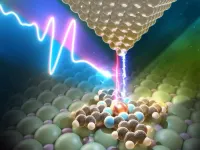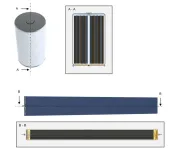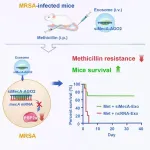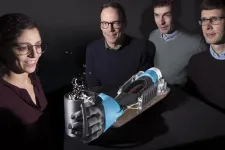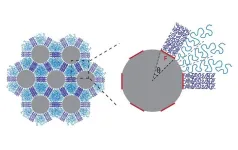Controlling electrons in molecules at ultrafast timescales
2025-03-06
Scientists at YOKOHAMA National University, in collaboration with RIKEN and other institutions in Japan and Korea, have made an important discovery about how electrons move and behave in molecules. This discovery could potentially lead to advances in electronics, energy transfer, and chemical reactions. Published in the Journal, Science, their study reveals a new way to control the distribution of electrons in molecules using very fast phase-controlled pulses of light in the terahertz range.
Atoms and molecules contain negatively charged electrons that usually stay in specific energy levels, like layers, ...
Tropical forests in the Americas are struggling to keep pace with climate change
2025-03-06
Embargoed until 14:00 US Eastern Time, Thursday 6 March 2025
Tropical forests in the Americas are struggling to keep pace with climate change
Tropical rainforests play a vital role in global climate regulation and biodiversity conservation. However, a major new study published in Science reveals that forests across the Americas are not adapting quickly enough to keep pace with climate change, raising concerns about their long-term resilience.
The research, led by Dr. Jesús Aguirre-Gutiérrez from the University of Oxford’s Environmental Change Institute (ECI), involved over 100 scientists ...
Brain mapping unlocks key Alzheimer’s insights
2025-03-06
Researchers from The University of Texas at Arlington and the University of California–San Francisco have used a new brain-mapping technique to identify memory-related brain cells vulnerable to protein buildup, a key factor in the development of Alzheimer’s disease, an incurable, progressive brain disorder that slowly destroys memory and thinking skills.
In Texas, nearly half a million people live with Alzheimer’s disease, a form of dementia that costs the state approximately $24 billion in caregiver time, according to the Texas Department of State Health Services. Texas ranks fourth in the nation for Alzheimer’s cases ...
Clinical trial tests novel stem-cell treatment for Parkinson’s disease
2025-03-06
A recently launched Phase 1 clinical trial at Mass General Brigham is examining the safety and feasibility of a groundbreaking treatment approach for Parkinson’s disease in which a patient’s stem cells are reprogrammed to replace dopamine cells in the brain damaged by the disease. The first-of-its-kind trial of an autologous stem cell transplant, based on research and technologies invented and validated preclinically at McLean Hospital’s Neuroregeneration Research Institute (NRI), has enrolled and treated three patients at Brigham and Women’s ...
Awareness of rocky mountain spotted fever saves lives
2025-03-06
Rocky Mountain spotted fever is a bacterial infection spread by biting ticks to humans and dogs. Found on every continent except Antarctica, the infectious disease has been spreading since the early 2000s, most notably in Mexico and Brazil. Of the cases reported, more than half of infected people and dogs die.
A paper led by the University of California, Davis, highlights one of the most effective but often missing solutions to surviving this preventable, deadly disease: awareness. Most fatal cases stem from delays in diagnosis and treatment.
“The No. 1 thing that prevents human death from Rocky Mountain spotted fever is for everyone at high risk to know ...
Breakthrough in noninvasive monitoring of molecular processes in deep tissue
2025-03-06
The prestigious journal Advanced Materials recently published a groundbreaking study introducing a new method for monitoring molecular processes deep within tissue. Developed at the Technion - Israel Institute of Technology, the innovation is expected to accelerate key advancements in personalized medicine, cancer diagnosis, and early disease detection. The research was led by Prof. Hossam Haick, postdoctoral fellow Dr. Arnab Maity, and Ph.D. student Vivian Darsa Maidantchik from the Wolfson Faculty of Chemical Engineering at the Technion. The study also involved Dr. Dalit Barkan, research assistant Dr. Keren ...
BU researcher named rising star in endocrinology
2025-03-06
(Boston)—Sun Lee, MD, MSc, assistant professor of medicine at Boston University Chobanian & Avedisian School of Medicine, has been awarded an American Association of Clinical Endocrinology (AACE) Rising Star in Endocrinology Award.
The honor is presented to a physician who is within 10 years of completing their endocrine fellowship and has demonstrated actionable outcomes in outstanding leadership, teamwork and/or innovation in support of AACE’s mission to elevate clinical endocrinology ...
Stressed New Yorkers can now seek care at Mount Sinai’s new resilience-focused medical practice
2025-03-06
The Center for Stress, Resilience and Personal Growth at Mount Sinai—a first-of-its-kind initiative launched in April 2020 at the height of the COVID-19 pandemic to address its psychosocial impact on Mount Sinai Health System’s workforce—is now offering confidential behavioral health treatment services to New Yorkers generally.
A team of clinical psychologists, psychiatrists, and licensed clinical social workers from the Center is now available to individuals 18 years and older who are interested in and could benefit from behavioral health treatment. Clinical services include cognitive behavioral therapy, ...
BU researchers uncover links between metabolism and aggressive breast cancer
2025-03-06
(Boston)—More than 120 million Americans suffer from diabetes or pre-diabetes. Triple-negative breast cancer (TNBC) is the most aggressive form of breast cancer, and TNBC patients with obesity-driven diabetes often have worse outcomes.
A new study by researchers from Boston University Chobanian & Avedisian School of Medicine helps explain why this happens and suggests a potential way to improve treatment for these patients.
At present, oncologists do not consider patients with breast cancer and obesity-driven diabetes differently in any significant way from patients with breast cancer who are otherwise healthy.
The new study, "Insulin Resistance Increases ...
Engineers took apart batteries from Tesla and China’s leading EV manufacturer to see what’s inside
2025-03-06
Two main manufacturers dominate the EV (electric vehicle) market: Tesla, which is most popular in Europe and North America, and BYD, which leads the Chinese EV market. However, both manufacturers have released limited data about their batteries, so the mechanical structure and characteristics of these battery cells has remained mysterious. To compare the batteries used by each manufacturer and better understand how EV batteries function overall, a team of researchers took one of each apart.
The results publish on March 6 in the Cell Press journal Cell Reports Physical Science and show that Tesla’s batteries prioritize high-energy density and performance, ...
Paralyzed man moves robotic arm with his thoughts
2025-03-06
Researchers at UC San Francisco have enabled a man who is paralyzed to control a robotic arm through a device that relays signals from his brain to a computer.
He was able to grasp, move and drop objects just by imagining himself performing the actions.
The device, known as a brain-computer interface (BCI), worked for a record 7 months without needing to be adjusted. Until now, such devices have only worked for a day or two.
The BCI relies on an AI model that can adjust to the small changes ...
Planetary science: More potential locations for ice on Moon
2025-03-06
Ice may be present a few centimetres below the Moon’s surface in more areas of the lunar polar regions than was previously thought due to large, yet highly localised, variations in surface temperatures. The results, published in Communications Earth & Environment, are derived from direct measurements taken at the lunar surface in 2023 by the Indian Chandrayaan-3 mission.
Future long-term exploration (or habitation) of the Moon will likely depend on the availability of ice to provide water, with the likelihood of ice formation in a ...
Injectable Therapy is 'magic' for those who can’t take HIV pills
2025-03-06
UCSF researchers are the first to demonstrate that the approach works for the patients who need it the most.
Patients who struggle to take daily HIV pills can benefit from long-acting injectable treatments, a new study by researchers at UCSF has found.
The strategy could also help stop the spread of HIV by keeping more patients from being infectious.
In 2021, federal regulators approved the first long-acting antiretroviral (LA-ART) injectable, which is a combination of long-acting cabotegravir and ...
siRNA-AGO2 complex inhibits bacterial gene translation: a novel therapeutic strategy for superbug infection
2025-03-06
Multidrug-resistant bacteria pose a major threat to human health. Manipulation of bacterial genes at the transcriptional level is a potential strategy to fight antibiotic-resistant bacterial infections by silencing their resistance genes. However, siRNAs have not been applied to regulate bacterial genes due to the lack of RNAi regulatory machinery, i.e., RNA-induced silencing complexes (RISCs), in bacteria. In addition, efficient methods for delivering siRNAs to bacteria in vivo are not currently available. In this study, ...
Memory is impaired in aged rats after 3 days of high-fat eating
2025-03-06
COLUMBUS, Ohio – Just a few days of eating a diet high in saturated fat could be enough to cause memory problems and related brain inflammation in older adults, a new study in rats suggests.
Researchers fed separate groups of young and old rats the high-fat diet for three days or for three months to compare how quickly changes happen in the brain versus the rest of the body when eating an unhealthy diet.
As expected based on previous diabetes and obesity research, eating fatty foods for three months led to metabolic problems, gut inflammation and dramatic shifts in gut bacteria in all rats compared to those that ate normal chow, while just three days of ...
Artificial muscles for tremor suppression
2025-03-06
Key points:
Slim and lightweight HASEL artificial muscles effectively suppress human tremor
Reproduction of patient recordings of tremor episodes in a robotic platform/mechanical patient
Computer simulation of tremor arm validates that forces are sufficient for practical applications
Avoiding time consuming clinical testing in early stages of technology development
Stuttgart/Tübingen – It is estimated that around 80 million people worldwide live with a tremor. For example, those who live with Parkinson's disease. The involuntary periodic movements sometimes strongly affect how patients are able ...
A new way to engineer composite materials
2025-03-06
— By Rachel Berkowitz
Composite adhesives like epoxy resins are excellent tools for joining and filling materials including wood, metal, and concrete. But there’s one problem: once a composite sets, it’s there forever. Now there’s a better way. Researchers have developed a simple polymer that serves as a strong and stable filler that can later be dissolved. It works like a tangled ball of yarn that, when pulled, unravels into separate fibers.
A new study led by researchers ...
AERA selects 29 exemplary scholars as 2025 Fellows
2025-03-06
WASHINGTON, March 6, 2025—The American Educational Research Association (AERA) has announced the selection of 29 exemplary scholars as 2025 AERA Fellows. The AERA Fellows Program honors scholars for their exceptional contributions to, and excellence in, education research. Nominated by their peers, the 2025 Fellows were selected by the Fellows Committee and approved by the AERA Council, the association’s elected governing body. They will be inducted during a ceremony at the 2025 Annual Meeting in Denver on April 24. With this cohort, there will be a total of 791 AERA Fellows.
“The ...
Touchless tech: Control fabrics with a wave of your finger
2025-03-06
A team of researchers from Nottingham Trent University (UK), Helmholtz-Zentrum Dresden-Rossendorf (HZDR) and Free University of Bozen-Bolzano (Italy) has created washable and durable magnetic field sensing electronic textiles – thought to be the first of their kind – which they say paves the way to transform use in clothing, as they report in the journal Communications Engineering (DOI: 10.1038/s44172-025-00373-x). This technology will allow users to interact with everyday textiles or specialized clothing by simply pointing their finger above a sensor.
The researchers show how they placed tiny flexible ...
JMIR aging invites submissions on the social and cultural drivers of health in aging adults
2025-03-06
(Toronto, March 6, 2025) JMIR Publications invites submissions to a new theme issue titled Social and Cultural Drivers of Health in Aging Populations in its open access journal JMIR Aging. The premier, peer-reviewed journal is indexed in PubMed, PubMed Central, MEDLINE, DOAJ, Scopus, and the Science Citation Index Expanded (Clarivate).
As aging populations grow worldwide, understanding the social and cultural factors that impact health outcomes in older adults has become a critical area of study. This theme issue aims to highlight the role of digital health ...
New research sheds light on why scleroderma affects mostly women and how to treat it
2025-03-06
Two new studies led by researchers at Hospital for Special Surgery (HSS) have uncovered key biological mechanisms driving systemic sclerosis (SSc), or scleroderma – a rare and often devastating autoimmune disease that causes fibrosis (tissue hardening) and inflammation. The research, published in the March issue of the Journal of Experimental Medicine, helps explain why the disease disproportionately affects women and reveals potential treatment targets, some of which are already in development.
Scleroderma affects approximately 300,000 people in the U.S., with about one-third ...
Lack of appropriate mental health care impacts quality of life for people with COPD
2025-03-06
Miami (March 6, 2025) – Mental health disorders in people with chronic obstructive pulmonary disease (COPD) are underdiagnosed and undertreated, leading to worsened symptoms and decreased quality of life, according to a new study. The study is published in the January 2025 issue of Chronic Obstructive Pulmonary Diseases: Journal of the COPD Foundation, a peer-reviewed, open-access journal.
COPD is an inflammatory lung disease, comprising several conditions, including chronic bronchitis and emphysema, and ...
Yawn! Many people are bored by spiritual practice
2025-03-06
We commonly consider spiritual practices sources of peace and inspiration. A recent study led by researchers of the University of Vienna shows that they can also be experienced differently: Many persons feel bored during these practices – and this can have far-reaching consequences. The results recently published in the academic journal Communications Psychology open up an entirely new field of research and provide fascinating insights into a phenomenon that has received only scant attention so far.
Even though boredom is a heavily researched subject at the moment, spiritual boredom has so far been largely neglected in research. Psychologists at the University of ...
A new algorithm sheds light on ‘disordered’ proteins
2025-03-06
The intrinsically disordered proteins (IDPs) do not attain a stable secondary or tertiary structure and rapidly change their conformation, making structure prediction particularly challenging. These proteins although exhibit chaotic and ‘disordered’ structures, they still perform essential functions.
The IDPs comprise approximately 30% of the human proteome and play important functional roles in transcription, translation, and signalling. Many mutations linked to neurological diseases, including amyotrophic lateral sclerosis (ALS), are located in intrinsically disordered protein regions (IDRs).
Powerful machine-learning algorithms, including ...
How’s the weather on Mars?
2025-03-06
A new study by researchers including those at the University of Tokyo revealed that atmospheric gravity waves play a crucial role in driving latitudinal air currents on Mars, particularly at high altitudes. The findings, based on long-term atmospheric data, offer a fresh perspective on the behaviors of Mars' middle atmosphere, highlighting fundamental differences from Earth’s. The study applied methods developed to explore Earth’s atmosphere to quantitatively estimate the influence of gravity waves on Mars’ planetary circulation.
Despite it being a very cold planet, Mars is quite a hot topic these days. With human visitation seemingly ...
[1] ... [603]
[604]
[605]
[606]
[607]
[608]
[609]
[610]
611
[612]
[613]
[614]
[615]
[616]
[617]
[618]
[619]
... [8790]
Press-News.org - Free Press Release Distribution service.
